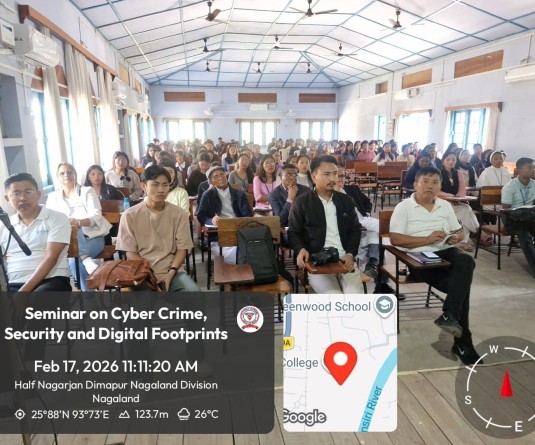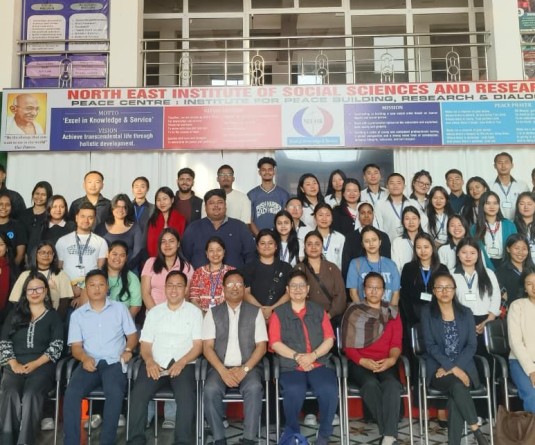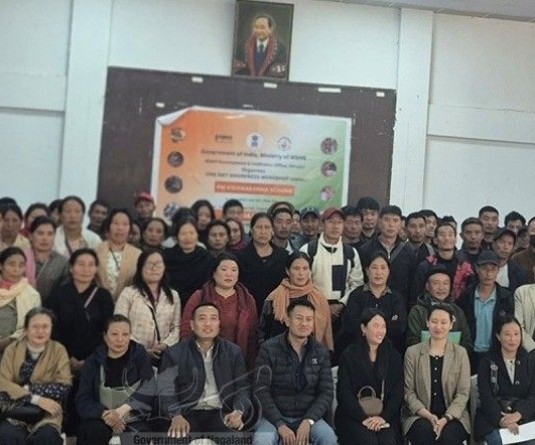A tourist with a participant of the Hornbill Festival on December 3, 2019, at the Naga Heritage Village, Kisama, the main venue of Nagaland’s premier festival. Dubbed as the 'Festival of Festivals,' this ten-day annual event from December 1-10 draws the majority of tourist visits to Nagaland. (Morung File Photo)
.jpg)
Morung Express News
Dimapur | April 8
The Nagaland Tourism Policy (NTP) for 2024, officially launched in the public domain by the State Tourism Department on March 20 batted for a three-tier system, with a Tourism Council as the apex level.
Notified on March 14, the NTP was formulated to facilitate infrastructural development, bolster promotion and marketing endeavours, and cultivate tourism awareness and promote the State as sustainable, community-centred tourism and preserve its diverse culture and its natural beauty, with “immediate effect.”
A comprehensive tourism policy highlighting the objective of tourism development in the state needs to be promulgated by the Government, and this policy enunciation precisely aims to point towards that direction, it said.
The NTP outlines key strategies for achieving tourism objectives. These include fostering collaboration among stakeholders, developing a tourism master plan, promoting responsible tourism practices, and enhancing marketing efforts. Additionally, the policy emphasised on community-based tourism initiatives, capacity building, and establishing a monitoring system for policy evaluation.
ACTION PLAN:
To develop the strategies into action, the NTP noted that tourism plans should not be seen primarily as the responsibility of the Tourism Department alone and involves different segment of the government, the policymakers, the legislators, the bureaucrats and the common people.
The policy stressed the necessity for coordinated efforts among all concerned departments and agencies involved in infrastructure development to ensure a thriving tourism industry and batted for the establishment of an organisational framework and the enhancement of state and local level planning to support this objective.
Accordingly, as per the Tourism Department, the NTP addresses these issues of organisational structure at three levels:
Apex Level: At the top, the NTP suggested for constitution of a Tourism Advisory Council or Nagaland Tourism Council headed by the Minister-in-charge of Tourism to act as a “Think Tank”.
Other members will include the Minister/Advisor of PWD (R&B), Rural Development, PHED, Forest & Environment, Horticulture, Agriculture, Tribal Affairs, Art & Culture, Industries, School Education, Urban Development & Municipal Affairs, the Chief Secretary and the Commissioner, Nagaland and any representative member from the industry, it said.
With Commissioner/Secretary (Tourism) as Member Secretary, the council would meet at least once a year, it said.
Departmental level: Meanwhile, at the Departmental level, the NTP said a high-level ‘Monitoring & Guidance Committee’ would be constituted with Administrative Head of Department (AHoD) Tourism) as chairperson, and other members comprising of AHoD of Agriculture, Horticulture, Rural Development, Works & Housing, PHED, Urban Development & Municipal Affairs, Art & Culture, Forest, Industries, School Education, Higher & Technical Education, Tribal Affairs, DUDA. The Director (Tourism) will be the Member Secretary of the Committee.
To achieve policy goals, the departmental organisation needs to be strengthened, with the creation of few posts, particularly at the managerial and execution level, the NTP stated.
It also informed that Nagaland Tourist information offices will be established or strengthened in Delhi, Mumbai, Shillong and Guwahati in addition to the one in Kolkata and whenever Nagaland Houses are established in metropolitan cities by the State Government.
The NTP underscored that District Tourism Offices need to be set up in all the districts for coordination at the district level.
The District Tourist Officer should take the full responsibility of identifying the tourist spots in their respective district, it said.
It also called for constitution of a “Research Cell cum Registration Cell” in Department of Tourism whose task is to gather tourist-related information and statistics to prepare a Data bank and give periodic advice to the Department as well as oversee registration of all activities under the Nagaland Registration of Tourist Trade Act.
The NTP also maintained that the State Tourism Department has a fully-fledged Engineering Cell created for creation and development of required infrastructure for Tourism Sector.
The Department will also work in close coordination with the Nagaland Tourism Association (NTA) as the representative members of the industry in the State, it said.
Local level: At the local level termed as ‘attraction specific,’ the NTP informs of the constitution of District Coordination Committee at every District, to be chaired by the Deputy Commissioner (DC) of each district, with representatives of the Municipal Affairs/Town Committees, Village Councils/VDBs, concerned Departments and Organisations involved in tourism activities as members.
The Tourist Officer will be Member Secretary of the Committee.
The Committee will regulate the operation and management of all tourist infrastructures and advice the Government of developmental activities as per the capacity of places recommended, it said.
Management of isolated attractions such as tourist rest houses, wayside amenities, waterfalls, picnic spots, etc., with minimum infrastructure would be in the hands of local organisations, it informed.
These organisations would also take care of the cleanliness and litter management of these attractions, it added.
Further, the DC of each district will coordinate the constitution of each Committee in each of the identified tourist destinations as well as potential tourist spots, the NTP said.
All DCs will also ensure that some of the developmental activities of tourism will also be incorporated in the District Plan Fund and in the programmes of RD, R&B, PHED, Power Department etc, it added.






